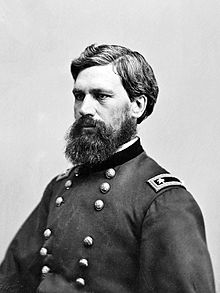
Back أوليفر هوارد Arabic اوليفر هوارد ARZ Oliver Howard AST Oliver Howard Catalan Oliver O. Howard Danish Oliver Otis Howard German Oliver Otis Howard Spanish اولیور اوتیس هووارد Persian Oliver Otis Howard French Oliver Otis Howard ID
This article needs additional citations for verification. (August 2011) |
Oliver Otis Howard | |
|---|---|
 Howard during the Civil War | |
| Nickname(s) |
|
| Born | November 8, 1830 Leeds, Maine, U.S. |
| Died | October 26, 1909 (aged 78) Burlington, Vermont, U.S. |
| Place of burial | |
| Allegiance | United States (Union) |
| Service | |
| Years of service | 1854–1894 |
| Rank | |
| Commands |
|
| Battles / wars | |
| Awards | |
| Alma mater | |
| Other work | President, Howard University Managing Director, Lincoln Memorial University |
| Signature | |
Oliver Otis Howard (November 8, 1830 – October 26, 1909) was a career United States Army officer and a Union general in the Civil War. As a brigade commander in the Army of the Potomac, Howard lost his right arm while leading his men against Confederate forces at the Battle of Fair Oaks/Seven Pines in June 1862, an action which later earned him the Medal of Honor. As a corps commander, he suffered a major defeat at Chancellorsville and his performance was of question at Gettysburg in May and July 1863.[1] However, he recovered from possible career setbacks as a successful corps and later army commander, commanding the Army of the Tennessee from July 27, 1864 until May 19, 1865 leading the army in the battles of Ezra Church, Battle of Jonesborough, Sherman's March to the Sea, and the Carolinas campaign in the Western Theater.
Known as the "Christian General" because he tried to base his policy decisions on his deep, evangelical piety,[1] he was given charge of the Freedmen's Bureau in mid-1865, with the mission of integrating the former slaves into Southern society and politics during the second phase of the Reconstruction Era. Howard took charge of labor policy, setting up a system that required freed people to work on former plantation land under pay scales fixed by the Bureau, on terms negotiated by the Bureau with white land owners. Howard's Bureau was primarily responsible for the legal affairs of the freedmen. He attempted to protect freed blacks from hostile conditions, but lacked adequate power, and was repeatedly frustrated by President Andrew Johnson.
Howard's allies, the Radical Republicans, won control of Congress in the 1866 elections and imposed Radical Reconstruction, with the result that freedmen were given the vote. With the help and advice of the Bureau, freedmen joined Republican coalitions and won at the ballot boxes of most of the southern states. Howard was also a leader in promoting higher education for freedmen, most notably in founding Howard University in Washington, D.C., and serving as its president 1867–73; and aided in the charter of Howard University and Atlanta University (now Clark Atlanta University) in 1867.
After 1874, Howard commanded troops in the West, conducting a famous campaign against the Nez Perce tribe, led by Chief Joseph. Utley (1987) concludes that his leadership against the Apaches in 1872, Nez Perce in 1877, Bannocks and Paiutes in 1878, and the Sheepeaters in 1879 all add up to a lengthy record, although he did not fight as much as George Custer or Nelson Miles.[2]